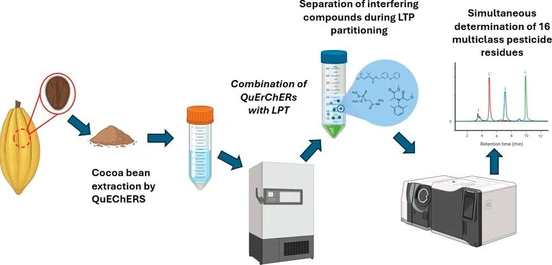Why orange juice sometimes smells of cloves

- Photo: TUM - Leibniz-LSB@TUM / Joseph Krpelan: PhD student Eva Bauersachs examining samples in the laboratory.
- Video: Leibniz-LSB@TUM: Fully Automated Solvent Assisted Flavour Evaporation
Industrially produced orange juice sometimes smells unpleasantly of cloves. A research team led by the Leibniz Institute for Food Systems Biology at the Technical University of Munich (TUM) has now solved the mystery surrounding this undesirable off-odor. The study published in the journal Food Chemistry identifies the use of peracetic acid as a cleaning agent for the production machines used in orange juice production as the cause.
 TUM - Leibniz-LSB@TUM / Joseph Krpelan: PhD student Eva Bauersachs examining samples in the laboratory.
TUM - Leibniz-LSB@TUM / Joseph Krpelan: PhD student Eva Bauersachs examining samples in the laboratory.
It is not the first time the orange juice industry has had to deal with clove odor. The previously known substance 4-vinylguaiacol is produced when the juice has been stored for too long. Testing for this has, therefore, been an established part of routine quality controls. Eva Bauersachs, Ph.D. student at the Leibniz Institute in Freising and first author of the study, explains: "Recently, however, we have received reports of orange juice samples that had a pronounced clove odor despite a low concentration of 4-vinylguaiacol. We therefore wondered which other odorants contribute to this undesirable aroma note."
To investigate this question, the research group led by Martin Steinhaus, head of the Food Metabolome Chemistry working group at the Leibniz Institute, carried out extensive investigations in cooperation with the Chair of Functional Phytometabolomics and the Chair of Food Chemistry and Molecular Sensory Science at TUM. Using techniques such as gas chromatography-olfactometry and aroma extract dilution analysis, the team identified the odorant 5-vinylguaiacol as the source of the off-odor in an orange juice with a pronounced clove aroma. The presence of this substance in orange juice was previously unknown.
As the results of the study show, the substance is mainly produced during the pasteurization process when residues of a cleaning agent react with hesperidin, a natural ingredient in orange juice, under the influence of heat. "Inadequate rinsing of the machines could therefore have led to contamination of the orange juice with peracetic acid and caused the formation of 5-vinylguaiacol during further processing," says study leader Martin Steinhaus. The research team, therefore, recommends that orange juice processing companies stop using peracetic acid as a cleaning agent.
Surprising variety: what orange juice can smell like
4- and 5-vinylguaiacol are not the only odorants that could cause off-flavors in orange juice. For example, heating orange juice can produce cabbage-like smelling dimethyl sulfide. Prolonged juice storage can also lead to chemical reactions that produce α-terpineol, which smells like turpentine. This odorant is formed under the influence of acid from the compounds limonene and linalool, which are present in high concentrations in orange juice. In addition, oxidation reactions during storage can lead to the formation of (S)-carvone from limonene, which smells like caraway.
- Bauersachs, E., Walser, V., Reglitz, K., Dawid, C., and Steinhaus, M. (2024). Peracetic acid residues in orange juice can lead to a 5-vinylguaiacol-induced clove-like off-flavor via Baeyer-Villiger oxidation of hesperidin. Food Chemistry 440, 138252. https://doi.org/10.1016/j.foodchem.2023.138252




